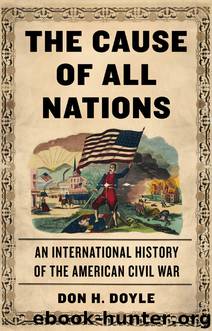The Cause of All Nations by Don H. Doyle

Author:Don H. Doyle [Doyle, Don H.]
Language: eng
Format: epub
ISBN: 9780465080922
Publisher: Basic Books
WHILE SLIDELL WORKED HIS WAY INTO THE INNER CIRCLE OF FRENCH power, the Confederacy’s continental public relations campaign was still awaiting direction from Edwin De Leon. The Southern ambassador to public opinion had been detained in Nassau, apparently by the blockade that was supposed to be so ineffective, and did not arrive in London until the end of June 1862. He stayed in London meddling in Mason’s and Hotze’s affairs; writing pieces for the London press; collaborating with James Spence, the South’s advocate from Liverpool; and arranging a private interview with Lord Palmerston. De Leon quickly came to view Hotze’s Index as utterly useless, since it was transparently an organ of the Confederate government, but he also seemed annoyed that Hotze had his own well-oiled, intelligent propaganda operation in place.47
In any case, De Leon was convinced that the Confederacy’s fortunes lay in France, not England. He left for Paris in July 1862, quickly set up offices, spent money freely, and soon enlisted a large corps of French journalists and editors willing to hire out their pens to the South. Convinced that it was a waste of money to try to influence readers in Paris, where liberal opinion ran strong, De Leon concentrated on the provincial press, which he thought more important in bringing popular pressure to bear on Napoleon III’s government. Within a short time he had well over two hundred French journalists on the Confederate payroll.48
While De Leon’s “bought opinions,” as he called them, were doing what they could to build public support for the Confederacy, he decided the French also needed to hear “the truth” from a native son of the South. He prepared a thirty-two-page pamphlet, La vérité sur les États Confédérés d’Amérique, for publication in Paris in August 1862. It came on the heels of Slidell’s cotton bribe as well as welcome news from the front that Confederate forces were advancing into Maryland.49
De Leon’s “truth” about the South offered French readers the perspective of a knowing witness to its valiant struggle for independence. He dismissed recent Union victories, including the capture of New Orleans, with the clever argument that these incursions would only inflame the South, “which battles for its homes and lands, for its liberty and the honor of its women.” New Orleans was naturally of great interest to the French, and this last reference was one of several pointed reminders of Union general Benjamin Butler’s infamous “woman’s order,” in which he warned that any woman caught insulting Union soldiers was “liable to be treated as a woman of the town plying her avocation,” meaning she would be treated as a prostitute. Southern sympathizers abroad interpreted it as license to rape Southern women.50
Unlike Slidell, who preferred to divert arguments about slavery to more “agreeable subjects,” De Leon set out to educate the French about the South’s special brand of slavery. His pamphlet ridiculed “Madam Stowe’s novel,” which “represents the slave’s goal to . . . massacre one’s master.” Instead, he emphasized the loyalty of the
Download
This site does not store any files on its server. We only index and link to content provided by other sites. Please contact the content providers to delete copyright contents if any and email us, we'll remove relevant links or contents immediately.
The Secret History by Donna Tartt(19061)
The Social Justice Warrior Handbook by Lisa De Pasquale(12188)
Thirteen Reasons Why by Jay Asher(8896)
This Is How You Lose Her by Junot Diaz(6878)
Weapons of Math Destruction by Cathy O'Neil(6268)
Zero to One by Peter Thiel(5790)
Beartown by Fredrik Backman(5738)
The Myth of the Strong Leader by Archie Brown(5502)
The Fire Next Time by James Baldwin(5433)
How Democracies Die by Steven Levitsky & Daniel Ziblatt(5216)
Promise Me, Dad by Joe Biden(5146)
Stone's Rules by Roger Stone(5082)
A Higher Loyalty: Truth, Lies, and Leadership by James Comey(4955)
100 Deadly Skills by Clint Emerson(4921)
Rise and Kill First by Ronen Bergman(4780)
Secrecy World by Jake Bernstein(4744)
The David Icke Guide to the Global Conspiracy (and how to end it) by David Icke(4710)
The Farm by Tom Rob Smith(4503)
The Doomsday Machine by Daniel Ellsberg(4486)
